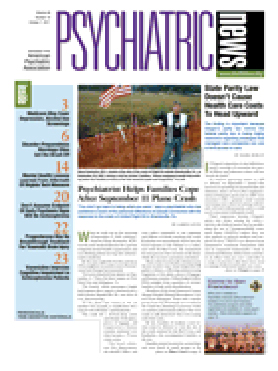While consumer-operated service programs (COSPs) such as drop-in centers and clubhouses have become increasingly recognized as key contributors to the recovery of those with serious mental illnesses, a study in the August Psychiatric Services suggests that community mental health agencies (CMHAs) should exercise caution when referring patients to these programs.
Specifically, the research findings call into question the effectiveness of those COSPs operating within a "top-down" organizational framework, noted study authors Steven Segal, Ph.D., M.S.W., of the University of California, Berkeley's School of Social Welfare; Carol Silverman, Ph.D., of UC Berkeley School of Law's Henderson Center for Social Justice; and Tanya Temkin, M.P.H., of Kaiser Permanente of Northern California in Oakland.
According to the researchers, COSPs are typically governed in one of two ways—as "self-help agency participant democracies" or as nonprofit organizations run by a board and staff. For this study, Segal, Silverman, and Temkin examined the treatment outcomes associated solely with hierarchically structured COSPs, which the researchers observed are quicker to get up and running and more prevalent than programs that afford a greater level of democratic consumer involvement.
The study authors formerly conducted similar research that compared the dedicated use of CMHAs with combined treatment at CMHAs and democratically operated COSPs. That study reported comparative improvements among those receiving dual services.
The new study involved 139 individuals seeking outpatient assistance from a county CMHA, with slightly greater than half of the participants randomly assigned to a combination of treatment at the CMHA and a nearby consumer-operated drop-in center offering such services as peer support and counseling. The second group of individuals received outpatient services only at the CMHA.
The subjects were interviewed at the beginning of their respective service options to establish baseline scores on four outcome-measurement scales: personal empowerment, self-efficacy, independent social integration, and hopelessness. Each participant was also administered the Brief Psychiatric Rating Scale (BPRS). The findings of these assessments were compared for both groups to the results of interviews conducted after eight months of continuous treatment.
While no differences were observed over time in the BPRS and hopelessness scores of the two groups, the researchers noted significant positive changes in the other three outcome measures, all of which were reported by participants receiving treatment solely through the CMHA. The study found that the group of consumers relying on services provided by both the CMHA and COSP experienced marked declines in self-efficacy and independent social integration. And while the latter group did report some improvement in the area of personal empowerment, that score roughly doubled in the CMHA-only cohort.
The researchers expressed some reservations about drawing too many assumptions from the results of their limited study, but they noted that the comparatively poor results of those in the combined treatment group echo concerns voiced by consumer groups about a need for greater and more equal consumer involvement in COSPs.

